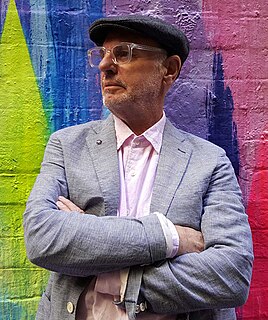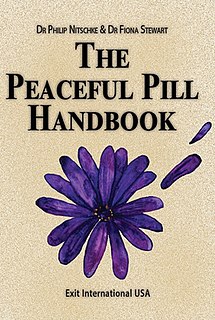The International Task Force on Euthanasia and Assisted Suicide is a 501(c)(3) non-profit educational organization that concerns itself with the issues of euthanasia, doctor-prescribed suicide, advance directives, assisted suicide proposals, "right-to-die" cases, disability rights, pain control, and related bioethical issues. They oppose the legalization of euthanasia. The executive director of the Task Force is lawyer Rita Marker, author of Deadly Compassion: The Death of Ann Humphry and the Truth About Euthanasia, which puts forth an account of the death of the wife of euthanasia advocate Derek Humphry. [1] In January 2011, The International Task Force changed its name to The Patients Rights Council. Their Frank Reed Memorial Library maintains the most and up-to-date collection in the world of books as well as periodical, newspaper and professional journal articles devoted to euthanasia, doctor-prescribed suicide and end-of-life issues.[ citation needed ]
Euthanasia is the practice of intentionally ending a life to relieve pain and suffering.
Assisted suicide, also known as assisted dying or medical aid in dying, is suicide undertaken with the aid of another person. The term usually refers to physician-assisted suicide (PAS), which is suicide that is assisted by a physician or other healthcare provider. Once it is determined that the person's situation qualifies under the physician-assisted suicide laws for that place, the physician's assistance is usually limited to writing a prescription for a lethal dose of drugs.

Philip Haig Nitschke is an Australian humanist, author, former physician and founder and director of the pro-euthanasia group Exit International. He campaigned successfully to have a legal euthanasia law passed in Australia's Northern Territory and assisted four people in ending their lives before the law was overturned by the Government of Australia. Nitschke was the first doctor in the world to administer a legal, voluntary, lethal injection, after which the patient activated the syringe using a computer. Nitschke states that he and his group are regularly subject to harassment by authorities. In 2015 Nitschke burned his medical practising certificate in response to what he saw as onerous conditions that violated his right to free speech, imposed on him by the Medical Board of Australia. Nitschke is variously referred to in the media as "Dr Death" or "the Elon Musk of assisted suicide".

Jack Kevorkian was an American pathologist and euthanasia proponent. He publicly championed a terminal patient's right to die by physician-assisted suicide, embodied in his quote "Dying is not a crime". Kevorkian said that he assisted at least 130 patients to that end. He was convicted of murder in 1999 and was often portrayed in the media with the name of "Dr. Death". There was support for his cause, and he helped set the platform for reform.
Compassion & Choices is a nonprofit organization in the United States working to improve patient rights and individual choice at the end of life, including access to medical aid in dying. Its primary function is advocating for and ensuring access to end-of-life options.
Voluntary euthanasia is where a person's life is ended at their request in order to relieve them of suffering. Voluntary euthanasia (VE) and physician-assisted suicide (PAS) have been the focus of intense debate in recent years.

Derek Humphry is a British-born American journalist and author notable as a proponent of legal assisted suicide and the right to die philosophy. In 1980, he co-founded the Hemlock Society and, in 2004, after that organization dissolved, he co-founded the Final Exit Network. From 1988 to 1990, he was president of the World Federation of Right to Die Societies and is the current president of the Euthanasia Research & Guidance Organization (ERGO).
The Hemlock Society was an American right-to-die and assisted suicide advocacy organization which existed from 1980 to 2003. It was co-founded in Santa Monica, California by British author and activist Derek Humphry, his wife Ann Wickett Humphry (1942-1991), and Gerald A. Larue. It relocated to Oregon in 1988 and, according to Humphry, had several homes over the course of its life. The group took its name from Conium maculatum, a highly poisonous biennial herbaceous flowering plant in the carrot family. The name was a direct reference to the method by which the Athenian philosopher Socrates took his life in 399 B.C., as described in Plato's Phaedo.
The World Federation of Right to Die Societies is an international federation of associations that promote access to voluntary euthanasia. It holds regular international meetings on dying and death.
Wesley J. Smith is an American lawyer and author, a Senior Fellow at the Discovery Institute's Center on Human Exceptionalism, a politically conservative non-profit think tank. He is also a consultant for the Patients Rights Council. Smith is known for his criticism of assisted suicide and utilitarian bioethics.
Euthanasia is illegal in most of the United States. Assisted suicide/assisted death is legal in Washington, D.C. and the states of California, Colorado, Oregon, Vermont, Maine, New Jersey, Hawaii, and Washington; its status is disputed in Montana, though currently authorized per the Montana Supreme Court's ruling in Baxter v. Montana that "nothing in Montana Supreme Court precedent or Montana statutes [indicates] that physician aid in dying is against public policy."

Dignity in Dying is a United Kingdom nationwide campaigning organisation. It is funded by voluntary contributions from members of the public, and as of December 2010, it claimed to have 25,000 actively subscribing supporters. The organisation declares it is independent of any political, religious or other affiliations, and has the stated primary aim of campaigning for individuals to have greater choice and more control over end-of-life decisions, so as to alleviate any suffering they may be undergoing as they near the end of their life.

Efforts to change government policies on euthanasia of humans in the 20th and 21st centuries have met limited success in Western countries. Human euthanasia policies have also been developed by a variety of NGOs, most notably medical associations and advocacy organizations. As of December 2020, active human euthanasia is legal in the Netherlands, Belgium, Colombia, Luxembourg, Western Australia, and Canada. Assisted suicide is legal in Switzerland, Germany, the Australian state of Victoria and in the U.S. states of Washington, Oregon, Colorado, Hawaii, Vermont, Maine, New Jersey, California, and in the District of Columbia.

The Peaceful Pill Handbook is a book setting out information on assisted suicide and voluntary euthanasia. It was originally published in the U.S. in 2006 and was written by the Australian doctor Philip Nitschke and lawyer Fiona Stewart. In 2008 the online handbook was launched. Called The Peaceful Pill eHandbook, it contains video clips on assisted suicide and voluntary euthanasia methods and related issues, but does not provide "how-to" instructions. The eHandbook is updated six times a year. A German edition of the print book—Die Friedliche Pille—was published in 2011. A French edition—La Pilule Paisible—was published in June 2015.
Suicide tourism, or euthanasia tourism, is the practice of potential suicide candidates travelling to a jurisdiction to commit assisted suicide or suicide. In some jurisdictions, assisted suicide is legal.
Euthanasia will remain illegal in New Zealand until the End of Life Choices Act 2019 takes full effect in November 2021. It is also illegal to "aid and abet suicide" under Section 179 of the New Zealand Crimes Act 1961. The clauses of this act make it an offence to "incite, procure or counsel" and "aid and abet" someone else to commit suicide, regardless of whether a suicide attempt is made or not. Section 179 covers both assisted suicide and true suicide, such as that caused by bullying. This will not change under the End of Life Choices Act 2019, which has provisions on coercion of terminally ill people.

Assisted suicide is defined as suicide committed with the aid of another person, sometimes a doctor. "Assisted suicide" has been used to describe what proponents refer to as medical aid in dying in the United States for terminally ill adults who self-administer barbiturates if they feel that they are suffering significantly. The term is often used interchangeably with physician-assisted suicide (PAS), "physician-assisted dying", "physician-assisted death", "assisted death" and "aid in dying".
There are many religious views on euthanasia, although many moral theologians are critical of the procedure.

Jean's Way, a book by Derek Humphry, is an account of Humphry's terminally ill wife's planned suicide from suffering. The book is his first on the issue of voluntary euthanasia and assisted suicide.
Assisted suicide, while criminal does not appear to have caused any convictions. Although a person who has assisted with the suicide must appear in court, article 37 of the Penal Code states: "The judges are authorized to forego [sic] punishment of a person whose previous life has been honorable where he commits a homicide motivated by compassion, induced by repeated requests of the victim.". Whilst not de jure permitting the act, it has been interpreted to mean that judges may pardon the defendant of their crime, and so de facto authorising assisted suicide.